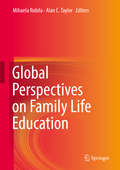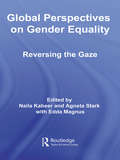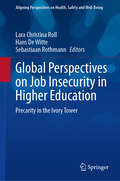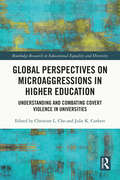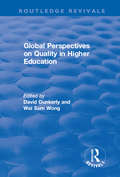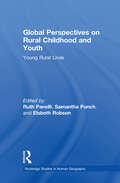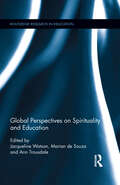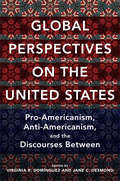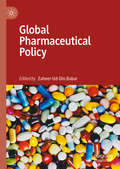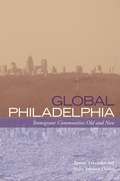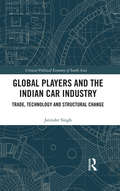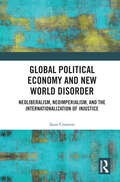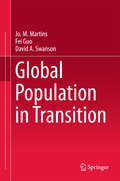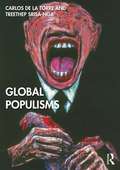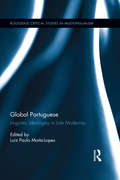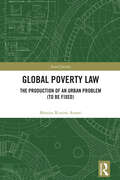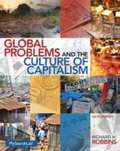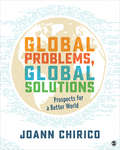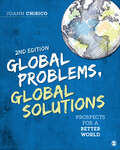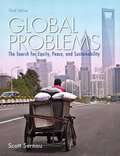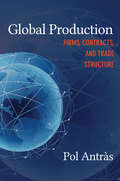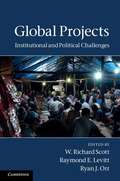- Table View
- List View
Global Perspectives on Family Life Education
by Alan C. Taylor Mihaela RobilaThis expansive reference examines the many types of Family Life Education (FLE) programs being offered around the world, reflecting a myriad of cultures and contexts. Coverage identifies core FLE content areas including parenting education, human sexuality, and interpersonal relationships, and details their programming in various countries over six continents, the Caribbean, and the Middle East. Contributors discuss complex challenges of program design, implementation, and evaluation, as well as connections between FLE and family prevention and intervention services. This knowledge is of great theoretical and practical utility across various fields, and is of particular interest to those developing programs for diverse populations.This unique volume:Presents in-depth information on Family Life Education programs from different countries around the world.Discusses how the socio-historic, political, and economic context of a country impacts its families and family services and programs.Covers current topics including poverty, domestic violence, and immigration.Encourages best practices and thorough understanding of the country/region.Offers recommendations for family service providers. Global Perspectives on Family Life Education is a trove of vital knowledge benefitting scholars and researchers as well as professors, postgraduates, graduate and undergraduate students, and practitioners in the family sciences, family life education, family therapy, social work, child and family studies, psychology, sociology, social work, cultural studies, and urban studies.
Global Perspectives on Gender Equality: Reversing the Gaze (Routledge/UNRISD Research in Gender and Development #Vol. 3)
by Naila Kabeer Agneta Stark Edda MagnusThe Nordic countries have long been seen as pioneers in promoting gender equality. The book brings together scholars from the global South and post-socialist economies to reflect on Nordic approaches to gender equality. The contributors to the book seek to explore from a comparative perspective the vision, values, policies, mechanisms, coalitions of interests and political processes that help to explain Nordic achievements on gender equality. While some contributors explore the Nordic experience through the prism of their own realities, others explore their own realities through the Nordic prism. By cutting across normal geographical boundaries, disciplinary boundaries and the boundaries between theory and policy, this book will be of interest to all readers with an interest in furthering gender equality.
Global Perspectives on Job Insecurity in Higher Education: Precarity in the Ivory Tower (Aligning Perspectives on Health, Safety and Well-Being)
by Sebastiaan Rothmann Hans De Witte Lara Christina RollThis compelling book delves into the damaging effects of job insecurity in higher education across ten countries, shedding light on its profound implications for individuals and institutions. By exploring the associations between job insecurity and critical factors such as health, well-being, and performance, it underscores the urgent need for effective intervention measures. The book also highlights the ripple effects of job insecurity on academic staff, researchers, PhD and postdoctoral students as well as administrative and support staff, ultimately impacting the quality of education. Featuring the largest cross-country data collection on this topic to date, this collaborative effort brings together leading international researchers to provide novel insights. Each chapter offers unique comparative analyses, making the book a vital resource for academics, policymakers, students, and readers worldwide who are invested in the future of higher education. It is both a call to action and a foundation for further research in this critical area.
Global Perspectives on Microaggressions in Higher Education: Understanding and Combating Covert Violence in Universities (Routledge Research in Educational Equality and Diversity)
by Christine L. ChoThis book recognizes microaggression as a pervasive issue in colleges and universities around the world and offers critical analyses of the local and institutional contexts in which such incidences of violence and discrimination occur. Authors from Egypt, Barbados, South Africa, Canada, and the United States explore the origins and forms of microaggression which impact students, faculty, and staff in higher education and address issues including xenophobia, sexual violence, linguistic discrimination, and racial prejudice. Drawing on a range of theoretical frameworks and utilizing empirical, qualitative, and ethnographic methods to consider microaggressions perpetrated by both students and staff, each chapter proposes practical ways to prevent violence through education, student agency, policy, and leadership. This book offers a contemporary global dialogue with educators and is vital reading for educators and administrators in higher education.
Global Perspectives on Quality in Higher Education (Routledge Revivals)
by DAVID DUNKERLEY AND WAI SUM WONGThis title was first published in 2001: An edited collection of essays from experts in the field of quality assurance in higher education. Each contributor provides a summary of recent developments in the respective countries centred on specific themes. They include an outline of the nature of higher education in the various countries, a description of recent developments in higher education quality assurance mechanisms together with discussions of the role of government, funding, the implications of emerging new trends such as distance learning, and non-traditional modes of delivery and assessment. The book should be of use to those working in higher education - both academics and policy makers - because of its comparative focus and ability to compare strategies and structures from one country to another. Similarly those working directly in assuring quality issues should also find the volume valuable.
Global Perspectives on Rural Childhood and Youth: Young Rural Lives (Routledge Studies in Human Geography)
by Ruth Panelli Elsbeth Robson Samantha PunchThis collection of international research and collaborative theoretical innovation examines the socio-cultural contexts and negotiations that young people face when growing up in rural settings across the world. This book is strikingly different to a standard edited book of loosely linked, but basically independent, chapters. In this case, the book presents both thematically organised case studies and co-authored commentaries that integrate and advance current understandings and debates about rural childhood and youth.
Global Perspectives on Spirituality and Education: Global Perspectives On Spirituality And Education (Routledge Research in Education)
by Marian De Souza Jacqueline Watson Ann TrousdaleIn recent decades, and around the world, much attention has been given to the role of spirituality in the education of children and young people. While educationalists share many common goals and values in nurturing the spiritual lives of children and young people, national and regional cultures, religions and politics have impacted on the approaches scholars and practitioners have adopted in their investigations and practices. The different contexts across nations and regions mean that educators face quite distinct conditions in which to frame their approaches to spiritual education and research, and the nature and impact of these differences is not yet understood. This book brings together thinkers from around the globe and sets them the task of explaining how their research on children’s spirituality and education has been shaped by the historical, cultural, religious and political contexts of the geographic region in which they work. The book presents contributions in three sections – Europe and Israel, Australasia, and The Americas– and concludes with a chapter highlighting what is common and what is contextually unique about global approaches to spirituality and education.
Global Perspectives on the United States: Pro-Americanism, Anti-Americanism, and the Discourses Between
by Jane Desmond Virginia DominguezThis daring collaborative effort showcases dialogues between international scholars engaged with the United States from abroad. The writers investigate the analytic methods and choices that label certain talk, images, behaviors, and allusions as "American" and how to read the data on such material. The editors present the essays in pairs that overlap in theme or region. Each author subsequently comments on the other's work. A third scholar or team of scholars from a different discipline or geographic location then provides another level of analysis. Contributors: Andrzej Antoszek, Sophia Balakian, Zsófia Bán, Sabine Bröck, Ian Condry, Kate Delaney, Jane C. Desmond, Virginia R. Dominguez, Ira Dworkin, Richard Ellis, Guillermo Ibarra, Seyed Mohammad Marandi, Giorgio Mariani, Ana Mauad, Loes Nas, Edward Schatz, Manar Shorbagy, Kristin Solli, Amy Spellacy, and Michael Titlestad.
Global Pharmaceutical Policy
by Zaheer-Ud-Din BabarMedicines are vital in improving patient health outcomes and pharmaceutical policy is a fundamental component of any health system. However, the global pharmaceutical policy is ever-evolving and data and quality ‘research-based information’ in this field are scarce. This book fills this gap and provides up-to-date empirical information and evidence-based synthesis. It focuses on pertinent key issues in global pharmaceutical policy including medicines safety, generic medicines, pharmaceutical supply chain, medicines financing, access and affordability of medicines, rational use of medicines, pharmacy health services research and access to vaccines and biological products. Featuring policy case studies from varied countries such as Mexico, Russia, China, Kyrgyzstan, and Pakistan, this book comprises a valuable and comprehensive resource for students, funders, policymakers, academics, and researchers interested in this field.
Global Philadelphia: Immigrant Communities Old and New
by Mary Johnson Takenaka Ayumi OsirimThe racial and ethnic composition of Philadelphia continues to diversify as a new wave of immigrants—largely from Asia and Latin America—reshape the city’s demographic landscape. Moreover, in a globalized economy, immigration is the key to a city’s survival and competitiveness. The contributors to Global Philadelphiaexamine how Philadelphia has affected its immigrants’ lives, and how these immigrants, in turn, have shaped Philadelphia. Providing a detailed historical, ethnographic, and sociological look at Philadelphia’s immigrant communities, this volume examines the social and economic dynamics of various ethnic populations. Significantly, the contributors make comparisons to and connections between the traditional immigrant groups—Germans, Italians, the Irish, Jews, Puerto Ricans, and Chinese—and newer arrivals, such as Cambodians, Haitians, Indians, Mexicans, and African immigrants of various nationalities. While their experiences vary, Global Philadelphia focuses on some of the critical features that face all immigrant groups—intra-group diversity, the role of institutions, and ties to the homeland. Taken together, these essays provide a richer understanding of the processes and implications of contemporary immigration to the area.
Global Players and the Indian Car Industry: Trade, Technology and Structural Change (Critical Political Economy of South Asia)
by Jatinder SinghThis book is one of the first critical analyses of the automobile industry in India. It studies the sector in general and the passenger car industry in particular, and provides valuable insights into the operation of Foreign Direct Investment (FDI) companies in a technology-intensive industry under changing economic regimes. The volume underlines the influence of the changing nature of foreign investment, the impact of economic reforms, technology regimes and industrial policy on growth, structural changes and development. It offers a detailed account of the trade performance of manufacturers in India’s passenger car industry. It also looks at successful cases to draw policy lessons towards encouraging quality FDI and developing India as a base for world production. A useful addition to industry studies in India, this book with its wide coverage and contemporary analyses will interest scholars and researchers of economics, Indian economy and industrial policy, industrial economics, automobile industry and manufacturing sector, development economics and international economics. It will also appeal to policymakers, practitioners and industrial associations.
Global Political Economy and New World Disorder: Neoliberalism, Neoimperialism, and the Internationalization of Injustice
by Sean CreavenDrawing upon a range of resources of critique (including critical realist social theory, realist international relations theory, the sociology of globalization, the Marxist critique of imperialism, and dependency theory), this book is an essential contribution to the critical understanding of nationalism and imperialism in the global age. It conducts a sustained and in-depth analysis of the relations between the asymmetry in the distribution of economic resources and powers of command, and the recent play of political events involving imperialist wars, including the Russo-Ukrainian and Israeli-Hamas wars. Crucially, the author argues that establishing these connections requires theorizing political economy in the so-called global age as comprised of neoimperial and neoliberal orders. As such, the book offers a new interpretation of the relations between neoliberalism and neoimperialism, and between modes of organizing social relations and resulting global disorders and instabilities. This will therefore be of interest to researchers, scholars, and students working at the intersection of global political economy, international relations, and the sociology of globalization.
Global Population in Transition
by David A. Swanson Jo. M. Martins Fei GuoThis book deals with macro and micro aspects of population change and their inter-face with socio-economic factors and impact. It examines theoretical notions and pursues their empirical manifestations and uses multidisciplinary approaches to population change and diversity. It investigates the organic nature of the relationships between socio-economic factors and population change and the feedback loops that affect socio-economic organisation and behaviour. The book brings together material often scattered in a number of sources and disciplines that helps to understand population change and their socio-economic aspects. In addition to dealing with the more conventional factors in population dynamics in the form of fertility, mortality and migration, the book examines socio-economic forces that influence them. It discusses population evolving attributes that affect population characteristics and social and behaviour and impact on the environment. Further, it deals with social organisation and pathways that lead to different social and economic development and standards of living of diverse populations.
Global Populisms (Routledge International Handbooks Ser.)
by Carlos de la Torre Treethep Srisa-ngaThis ground-breaking textbook describes and explains the global manifestations of populism. It reviews controversies about its relationships with democracy in the distinct and interrelated histories of the Americas, Asia, and Europe. The volume surveys the similarities and differences between populism, nationalism, fascism, and populist uses of religion and the media. Global Populisms invites students and the general public to move beyond simplistic conceptualizations of populism as an external virus and as an irrational threat to democracy, or, alternatively, as the path to return power to the people. The book differentiates populists’ correct critiques to inequalities, the loss of national sovereignty, and unresponsive politicians from its solutions. In the name of giving power to the people, populists in power from Hugo Chávez to Donald Trump, Narendra Modi, and Viktor Orbán entered in war with the media, made rivals into existential enemies, and attempted to concentrate power in the hands of the president. Written in a clear and accessible style, this interdisciplinary volume will appeal to undergraduate students as well as to non-academic audiences with an interest in political science, sociology, history, and communication studies.
Global Portuguese: Linguistic Ideologies in Late Modernity (Routledge Critical Studies in Multilingualism)
by Luiz Paulo Moita-LopesThis book aims at deconstructing and problematizing linguistic ideologies related to Portuguese in late modernity and questioning the theoretical presuppositions which have led us to call Portuguese ‘a language.’ Such an endeavor is crucial when we know that Portuguese is a language which is increasingly internationalized, used as the official language in four continents (in ten countries) and which has come to play a relevant role in the so-called linguistic market on the basis of the geopolitical transformations in a multipolar world. The book covers a wide range of social, political and historical contexts in which ‘Portuguese’ is used (in Brazil, Canada, East-Timor, England, Portugal, Mozambique and Uruguay), and considers diverse linguistic practices. Through this critique, contributors chart new directions for research on language ideologies and language practices (including research related to Portuguese and to other ‘languages’) and consider ways of developing new conceptual compasses that are better attuned to the sociolinguistic realities of the late modern era, in which people, texts and languages are increasingly in movement through national borders and those of digital networks of communication.
Global Poverty Law: The Production of an Urban Problem (To Be Fixed) (ISSN)
by Moniza Rizzini AnsariThis book demonstrates how the various legal efforts employed to eradicate global urban poverty also play a significant role in shaping it.Urban poverty has been widely examined as a social problem that requires attention and social commitment. Law is often seen as both an important contributor to the problem as well as a source of crucial tools to overcome it. In spite of this, however, poverty is surprisingly disregarded within legal scholarship. This book counters this by drawing on legal theory, legal history, and legal geography to inquire how urban poverty is made visible and invisible as a problem across global cities. More specifically, it investigates the mechanisms and networks through which global urban poverty has been conceptually and materially shaped in a way that fits the remit of global corporate philanthropy and the development aid agenda. By following law’s circuitous interactions with poverty knowledge and antipoverty interventions, the book demonstrates how it plays a historical role in making poverty seen, known, and remedied. As a result, the book argues, law consolidates a stable image of poverty as an essential ‘problem’ – to be uniformly found worldwide and so reasonably fixable with the appropriate legal reforms. Taking poverty to be a fundamental manifestation of social injustice, the book thus raises key questions about the role of law in the achievement of social justice.This innovative and insightful account of the relationship between law and poverty will appeal to scholars in critical and socio-legal studies, as well as others working in poverty studies, urban studies, development studies, geography, sociology, and social policy.
Global Powers
by Ralph SchroederMichael Mann is a central figure in contemporary sociology. His analysis of how the four sources of social power - ideological, economic, military and political - have shaped world history is a major contribution to social science. In this volume, distinguished scholars assess Mann's work, focusing on his final two volumes of Sources of Social Power, which deal with the twentieth and twenty-first centuries. They tackle some of the major themes in Mann's work including globalisation, American empire and the recent financial crisis. They also question his stance on some perennial topics in sociology: is the trajectory of American society 'exceptional'? How is military power different from the other sources of power? What is the role of agency and ideology in social change? How do the relations between states affect domestic social development? Global Powers will provoke debate among all those interested in understanding the next phase of globalisation.
Global Problems and the Culture of Capitalism
by Richard H. Robbins<p>Examines the development and impact of capitalist culture. <p>From its roots more than 500 years ago to the present day, capitalism expanded from Western Europe to the United States and then to much of the rest of the world. This expansion has not gone uncontested; resistance has been both direct and indirect, including political, religious, and social protest, and even revolution. How and why capitalist culture developed and the reasons why some groups resisted and continue to resist its development are among the issues explored in Global Problems and the Culture of Capitalism, 6/e.</p>
Global Problems, Global Solutions: Prospects for a Better World
by JoAnn A. ChiricoGlobal Problems, Global Solutions: Prospects for a Better World by JoAnn Chirico approaches social problems from a global perspective with an emphasis on using one’s sociological imagination. Perfect for instructors who involve students in research, this text connects problems borne by individuals to regional, global, and historical forces, and stresses the importance of evidence in forming opinions and policies addressing social issues. The book introduces readers to the complexities of the major problems that confront us today such as violent conflict, poverty, climate change, human trafficking and other issues that we encounter in our lives. It book concludes with a chapter on politics and government, underscoring the need for good governance at all levels–and cooperation among many layers of government–to build a better world.
Global Problems, Global Solutions: Prospects for a Better World
by JoAnn A. ChiricoGlobal Problems, Global Solutions: Prospects for a Better World by JoAnn Chirico approaches social problems from a global perspective with an emphasis on using one’s sociological imagination. Perfect for instructors who involve students in research, this text connects problems borne by individuals to regional, global, and historical forces, and stresses the importance of evidence in forming opinions and policies addressing social issues. The book introduces readers to the complexities of the major problems that confront us today such as violent conflict, poverty, climate change, human trafficking and other issues that we encounter in our lives. It book concludes with a chapter on politics and government, underscoring the need for good governance at all levels–and cooperation among many layers of government–to build a better world.
Global Problems, Global Solutions: Prospects for a Better World
by JoAnn A. ChiricoGlobal Problems, Global Solutions: Prospects for a Better World approaches social problems from a global perspective with an emphasis on using one’s sociological imagination. Perfect for instructors who involve students in research, this text connects problems borne by individuals to regional, global and historical forces, and stresses the importance of evidence in forming opinions and policies addressing social issues. The Second Edition explores three broad themes--nourishing human capital, restoring civility, and sustaining natural and manufactured environments--as it examines the causes and consequences of a range of problems related to economic inequality, discrimination and persecution, war and violence, food production, population flows, health and longevity, the environment, and other issues that we encounter in our lives. The book concludes with a chapter on politics and government, underscoring the need for good governance at all levels–and cooperation among many layers of government–to build a better world.
Global Problems, Global Solutions: Prospects for a Better World
by JoAnn A. ChiricoGlobal Problems, Global Solutions: Prospects for a Better World approaches social problems from a global perspective with an emphasis on using one’s sociological imagination. Perfect for instructors who involve students in research, this text connects problems borne by individuals to regional, global and historical forces, and stresses the importance of evidence in forming opinions and policies addressing social issues. The Second Edition explores three broad themes--nourishing human capital, restoring civility, and sustaining natural and manufactured environments--as it examines the causes and consequences of a range of problems related to economic inequality, discrimination and persecution, war and violence, food production, population flows, health and longevity, the environment, and other issues that we encounter in our lives. The book concludes with a chapter on politics and government, underscoring the need for good governance at all levels–and cooperation among many layers of government–to build a better world.
Global Problems: The Search for Equity, Peace, and Sustainability
by Scott R. SernauExploring social problems on a global scale . This text uses social science perspectives to examine the various dimensions of globalization, the social problems of inequality, war and violence, and environmental sustainability that are occurring on a global scale. Clear writing and vivid examples help students to better understand their role as global citizens. The book was designed for courses such as Global Issues, Contemporary Problems, Social Problems, Social Stratification, World Cultures, and Social Change. Learning Goals Upon completing this book, readers should be able to: Understand social problems on a global scale - from inequalities to sustainability See the interconnections of the world and people throughout the world Learn about issues with a multinational and multidisciplinary approach, so readers will be able to have a broader understanding of the subject
Global Production
by Pol AntràsGlobal Production is the first book to provide a fully comprehensive overview of the complicated issues facing multinational companies and their global sourcing strategies. Few international trade transactions today are based on the exchange of finished goods; rather, the majority of transactions are dominated by sales of individual components and intermediary services. Many firms organize global production around offshoring parts, components, and services to producers in distant countries, and contracts are drawn up specific to the parties and distinct legal systems involved. Pol Antràs examines the contractual frictions that arise in the international system of production and how these frictions influence the world economy.Antràs discusses the inevitable complications that develop in contract negotiation and execution. He provides a unified framework that sheds light on the factors helping global firms determine production locations and other organizational choices. Antràs also implements a series of systematic empirical tests, based on recent data from the U.S. Customs and Census Offices, which demonstrate the relevance of contractual factors in global production decisions. Using an integrated approach, Global Production is an excellent resource for researchers, graduate students, and advanced undergraduates interested in the inner workings of international economics and trade.
Global Projects
by W. Richard Scott Raymond E. Levitt Ryan J. OrrAn analysis of the institutional and social movement processes that surround global infrastructure projects.
